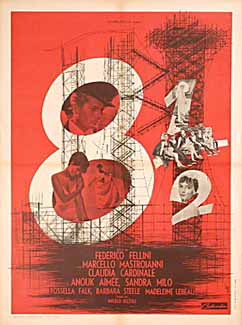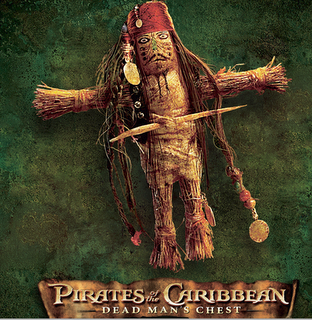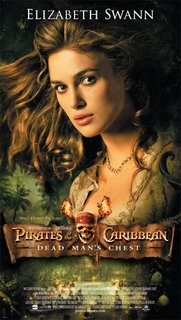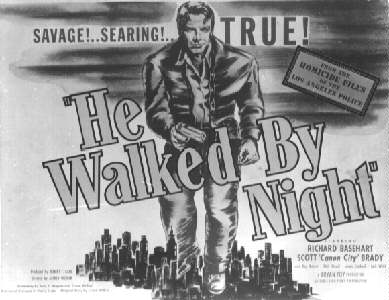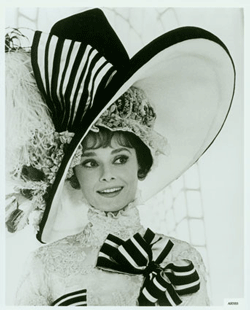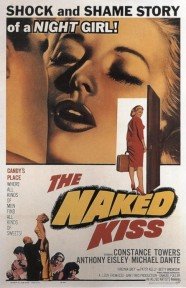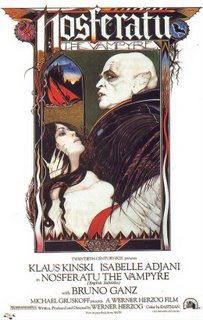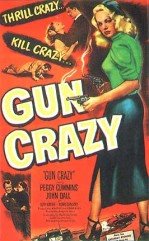 Almost 30 to be capsuled films have I got here, and I'm gonna try to get as many done as I can. Fueled by a refreshing vodka martini and with Orson Welles's Othello (green-eyed monster indeed) playing on the tivo.
Almost 30 to be capsuled films have I got here, and I'm gonna try to get as many done as I can. Fueled by a refreshing vodka martini and with Orson Welles's Othello (green-eyed monster indeed) playing on the tivo.Cars - I've only managed to see three Pixar films (this, Toy Story and The Incredibles), and only one (Toy Story) on the Big Screen, so I was taken aback at how cool the film looked in the theatre. Very high definition, great detail on the cars and such, but my favorite visuals were the backgrounds: clouds in car shapes, Monument Valley-style mesas in the shape of hood ornaments. They just exist there in the background, never being forced into view as you'd expect to find in a kids film. This is an animated film with an actual visual style, which is rare indeed in the genre of Disney animation (save Sleeping Beauty and maybe a couple others). I am a little bothered by the potential conservatism of the film's message: that progress is bad, that the image we have of a 1950s on Route 66 is a paradise and what we should be striving to remake. On the other hand, the film can be interpreted as an Eastern call for renunciation of modern concerns with speed and wealth creation in favor of simplicity, community and personal peace and enlightenment. So, if anything, it highlights the conservative tendency in hippie politics, I guess. I walked out of the film asking myself why there weren't any African-American cars. then it was pointed out to me that there was (Flo, the "wife" of the Hispanic tattoo-artist car). So I wonder if that says something about the film's depiction of racial stereotypes or my own (in)ability to recognize such stereotypes when I see them.
Devil In A Blue Dress - Denzel Washington is great in this film noir set in post-WW2 Los Angeles, specifically that city's black communities. He's a war veteran with a mortgage and no job who gets suckered into working as a detective for rich, politically connected white people, one of whom has lost his girlfriend, a woman who likes to hang out in the, shall we say, darker areas of town. Movement back and forth between white and black, socially, geographically and racially is a recurring motiff of the film, but I'm not entirely sure the film has anything coherent to say about the subject. It works entertainingly enough as a noir, mainly due to terrific performances by the always great Washington and Don Cheadle.
 Mogambo - Forgettable misfire by John Ford. The three great popular American directors of the 40s and 50s, Ford, Howard Hawks and John Huston all managed to get the money to send them off to Africa to make films, but only one of them managed to make something really interesting (Huston's The African Queen), and even that spawned a very fine Clint Eastwood film about its making (White Hunter, Black Heart, #11, 1990). Mogambo stars Clark Gable, who I've never been a big fan of, outside of It Happened One Night, and this film certainly didn't convert me. He runs safaris in Africa and has to deal with two women who love him, for some reason. There's the slutty Ava Gardner and the prim Grace Kelly. I imagine there was a time when this plot was fresh and interesting, but I'm certain that by the time sound was introduced to film, it's was a dull cliché.
Mogambo - Forgettable misfire by John Ford. The three great popular American directors of the 40s and 50s, Ford, Howard Hawks and John Huston all managed to get the money to send them off to Africa to make films, but only one of them managed to make something really interesting (Huston's The African Queen), and even that spawned a very fine Clint Eastwood film about its making (White Hunter, Black Heart, #11, 1990). Mogambo stars Clark Gable, who I've never been a big fan of, outside of It Happened One Night, and this film certainly didn't convert me. He runs safaris in Africa and has to deal with two women who love him, for some reason. There's the slutty Ava Gardner and the prim Grace Kelly. I imagine there was a time when this plot was fresh and interesting, but I'm certain that by the time sound was introduced to film, it's was a dull cliché.Palm Beach Story - I had a weird experience watching this on the old tivo a few weeks ago. I'd always counted it among the Preston Sturges films I hadn't seen, yet while watching it, I remembered everything about it. Either a case of filmic deja vu, or I'd seen it before. The thing is, I have no idea when or where or how I would have watched it. Anyway, it's a Sturges screwball comedy about the dissolution of a marriage. Greedy Claudette Colbert runs away to get a divorce from low-wage earning dreamer Joel McRea. He follows her to Florida where them become involved with a pair of wealthy siblings, Mary Astor and Rudy Vallee. Much complex hilarity ensues.
Back To Bataan - John Wayne and Anthony Quinn fight the Japanese in the Phillipines during World War 2. Maybe I wasn't paying close enough attention, but there wasn't anything memorable about this film for me. The director, Edward Dmytryk has a good reputation, though I wasn't a big fan of his previous film, Murder, My Sweet. Standard Hollywood WW2 fare, not bad, but not especially interesting either.
 Cinema Paradiso - Talk about a disappointment. After hearing and reading so many raves about this film, about how every movie geek on Earth loves or will love it, imagine my surprise when I discover that it's nothing but a sentimental coming of age story of the most generic kind. The only interesting thing about it is it's setting (a movie theatre, naturally). But even that managed to annoy me, what with the film's not so much implication as blatant assertion that a film projectionist's job could quite easily be done by a 10 year old boy. Ouch. There are some nice moments here, but I don't know that it's worth sitting through all the schmaltz.
Cinema Paradiso - Talk about a disappointment. After hearing and reading so many raves about this film, about how every movie geek on Earth loves or will love it, imagine my surprise when I discover that it's nothing but a sentimental coming of age story of the most generic kind. The only interesting thing about it is it's setting (a movie theatre, naturally). But even that managed to annoy me, what with the film's not so much implication as blatant assertion that a film projectionist's job could quite easily be done by a 10 year old boy. Ouch. There are some nice moments here, but I don't know that it's worth sitting through all the schmaltz.The Naked Spur - Anthony Mann-James Stewart Western, with Stewart as a bounty hunter who captures Robert Ryan (and his sort-of girlfriend, a surprisingly unattractive Janet Leigh) and takes him on a long trek to Kansas and his reward. Stewart plays another dark, unheroic character, as he did a lot of in the 50s, and the battle of wills between him and Ryan is tense and entertaining. Mann once again plays with conventions by making the Ryan character the far more attractive character: he's funny, and charismatic, Stewart is dull, mean and not all that bright. Ralph meeker and Millard Mitchell give fine supporting performances, but Ryan's the real find. For an actor I couldn't tell you a thing about a year ago, he sure has had a lot of great performances in a lot of great films: Flying Leathernecks, The Set-Up, King Of Kings, The Longest Day, etc.
The Private Life Of Sherlock Holmes - The sad diminution of age afflicted the great Billy Wilder as well in this mediocre, not especially funny Holmes film that plays with the possibility that Holmes may have been gay for no apparent reason other than that the idea of a famous character being gay is a bit amusing. That whole theme though is dropped after the first 20 minutes or so as Holmes and Watson get tangled up in a rather uninteresting mystery involving german spies and the Loch Ness Monster, during which Holmes carries on a quite heterosexual relationship with their client, played by Geneviève Page.
 Mutiny On The Bounty - In the last couple weeks I've watched both the 1935 and 1962 versions of this story, to go along with The Bounty, the 1984 film (#14 that year) starring Anthony Hopkins and Mel Gibson that I've seen a couple of times. The '35 version (directed by Frank Lloyd, the number two directing Frank of the 30s, after Capra) features Clark gable as mutineer Fletcher Christian and Charles Laughton as Captain Bligh. Laughton, who I think may simultaneously be the greatest and ugliest actor in film history, plays Bligh as a sadist, he takes a physical pleasure in the beatings he inflicts on his crew. he's a perverse authoritarian, and contrasted with Gable's Christian, he's an unmistakable synonym for the sadistic authoritarians in vogue in the mid-30s (Hitler, Mussolini, Stalin and Franco). Gable, in contrast to this, is essentially George Washington and Thomas Jefferson and Winston Churchill (I know it's an anachronism) rolled into one. His mutiny is not an act of self-interest, greed, lust or cowardice, but an assertion of the rights of man and the necessity for democracy. The society he eventually creates on Pitcairn Island is America in miniature.
Mutiny On The Bounty - In the last couple weeks I've watched both the 1935 and 1962 versions of this story, to go along with The Bounty, the 1984 film (#14 that year) starring Anthony Hopkins and Mel Gibson that I've seen a couple of times. The '35 version (directed by Frank Lloyd, the number two directing Frank of the 30s, after Capra) features Clark gable as mutineer Fletcher Christian and Charles Laughton as Captain Bligh. Laughton, who I think may simultaneously be the greatest and ugliest actor in film history, plays Bligh as a sadist, he takes a physical pleasure in the beatings he inflicts on his crew. he's a perverse authoritarian, and contrasted with Gable's Christian, he's an unmistakable synonym for the sadistic authoritarians in vogue in the mid-30s (Hitler, Mussolini, Stalin and Franco). Gable, in contrast to this, is essentially George Washington and Thomas Jefferson and Winston Churchill (I know it's an anachronism) rolled into one. His mutiny is not an act of self-interest, greed, lust or cowardice, but an assertion of the rights of man and the necessity for democracy. The society he eventually creates on Pitcairn Island is America in miniature. The '62 film (directed by Lewis Milestone (All Quiet On The Western Front, Ocean's Eleven) after Carol Reed was fired), on the other hand, has Marlon Brando playing Christian as a wealthy fop of questionable heterosexuality (at least until he hooks up with a hot Tahitian chick). Brando, being the brilliant actor he is, is hilarious in his sarcastic sneer and the titled nonchalance with which he goes about his first mate duties on-board ship. It's only when Trevor Howard's Bligh actually kicks him that Brando fights back. That Bligh's somewhere in-between Laugton's sick freak and Hopkins's neurotic coward. He's a bureaucrat more than anything else. I like Howard, he's great in films like The Third Man and Brief Encounter, but these three films feature perhaps my three all-time favorite actors (Laughton, Brando and Hopkins) and he really can't compete in that class. Regardless, this film sees Christian not as a hero but as a rich man who ultimately acts only in his own self-interest (he only decides to mutiny after he's struck Bligh in a moment of blind rage/self-defense and his own fate is already sealed (the penalty for striking a superior officer being death). In an odd coda to the film, on Pitcairn, Brando's Christian decides they need to sail the ship back to England so they can all take their punishment honorably. His crew then sets fire to the ship, and Brando is fatally burned in the blaze. Either the film's trying to assert that Christian really was an honorable man, or it's making his selfishness absolutely clear.
The '62 film (directed by Lewis Milestone (All Quiet On The Western Front, Ocean's Eleven) after Carol Reed was fired), on the other hand, has Marlon Brando playing Christian as a wealthy fop of questionable heterosexuality (at least until he hooks up with a hot Tahitian chick). Brando, being the brilliant actor he is, is hilarious in his sarcastic sneer and the titled nonchalance with which he goes about his first mate duties on-board ship. It's only when Trevor Howard's Bligh actually kicks him that Brando fights back. That Bligh's somewhere in-between Laugton's sick freak and Hopkins's neurotic coward. He's a bureaucrat more than anything else. I like Howard, he's great in films like The Third Man and Brief Encounter, but these three films feature perhaps my three all-time favorite actors (Laughton, Brando and Hopkins) and he really can't compete in that class. Regardless, this film sees Christian not as a hero but as a rich man who ultimately acts only in his own self-interest (he only decides to mutiny after he's struck Bligh in a moment of blind rage/self-defense and his own fate is already sealed (the penalty for striking a superior officer being death). In an odd coda to the film, on Pitcairn, Brando's Christian decides they need to sail the ship back to England so they can all take their punishment honorably. His crew then sets fire to the ship, and Brando is fatally burned in the blaze. Either the film's trying to assert that Christian really was an honorable man, or it's making his selfishness absolutely clear. Anyway, neither film is as good as The Bounty (directed by Roger Donaldson (No Way Out, Cocktail, Dante's Peak, White Sands, Cadillac Man, Thirteen Days, The Getaway and The World's Fastest Indian, but with a screenplay by the great Robert Bolt (Lawrence Of Arabia, A Man For All Seasons, Dr. Zhivago and The Mission)) the the '35 is probably better, if only because in all the 3 1/2 hours of the 1962 version they still managed to gloss over the one truly remarkable fact about the whole incident: that Bligh managed to sail a little longboat across thousands of miles of ocean with very little food and nothing more than a tiny sail and a decent compass. A fact Patrick O'Brian has much praise for in Desolation Island, in which Captain Jack Aubrey and Dr. Stephen Maturin are sent to Australia to rescue Bligh, who's managed to have an entire prison colony mutiny against him. I'd take Master And Commander over the whole lot of them. Maybe even Pirates Of the Caribbean 2, for that matter. Must have a weakness for Captain Jacks, or something.
Anyway, neither film is as good as The Bounty (directed by Roger Donaldson (No Way Out, Cocktail, Dante's Peak, White Sands, Cadillac Man, Thirteen Days, The Getaway and The World's Fastest Indian, but with a screenplay by the great Robert Bolt (Lawrence Of Arabia, A Man For All Seasons, Dr. Zhivago and The Mission)) the the '35 is probably better, if only because in all the 3 1/2 hours of the 1962 version they still managed to gloss over the one truly remarkable fact about the whole incident: that Bligh managed to sail a little longboat across thousands of miles of ocean with very little food and nothing more than a tiny sail and a decent compass. A fact Patrick O'Brian has much praise for in Desolation Island, in which Captain Jack Aubrey and Dr. Stephen Maturin are sent to Australia to rescue Bligh, who's managed to have an entire prison colony mutiny against him. I'd take Master And Commander over the whole lot of them. Maybe even Pirates Of the Caribbean 2, for that matter. Must have a weakness for Captain Jacks, or something.






